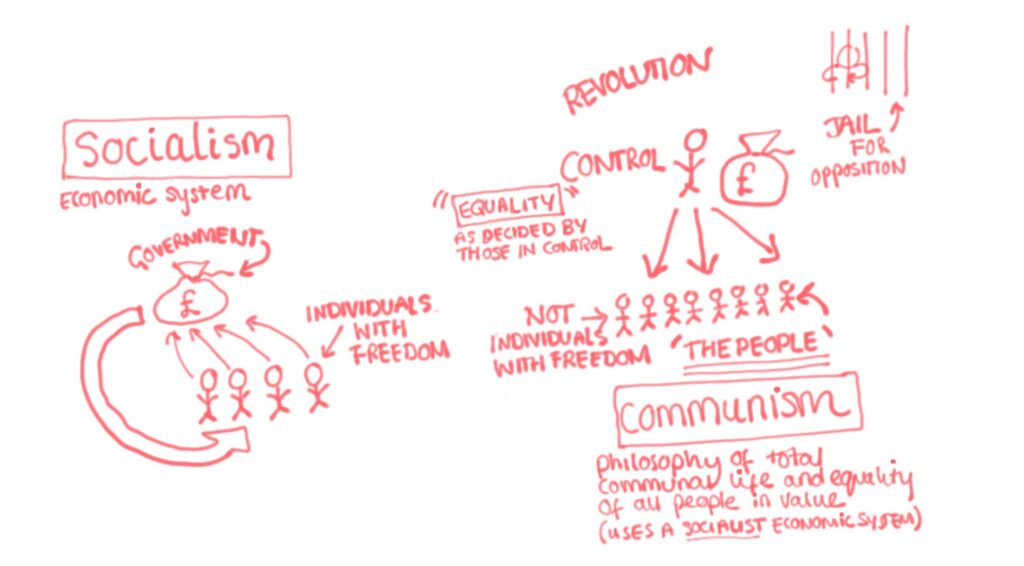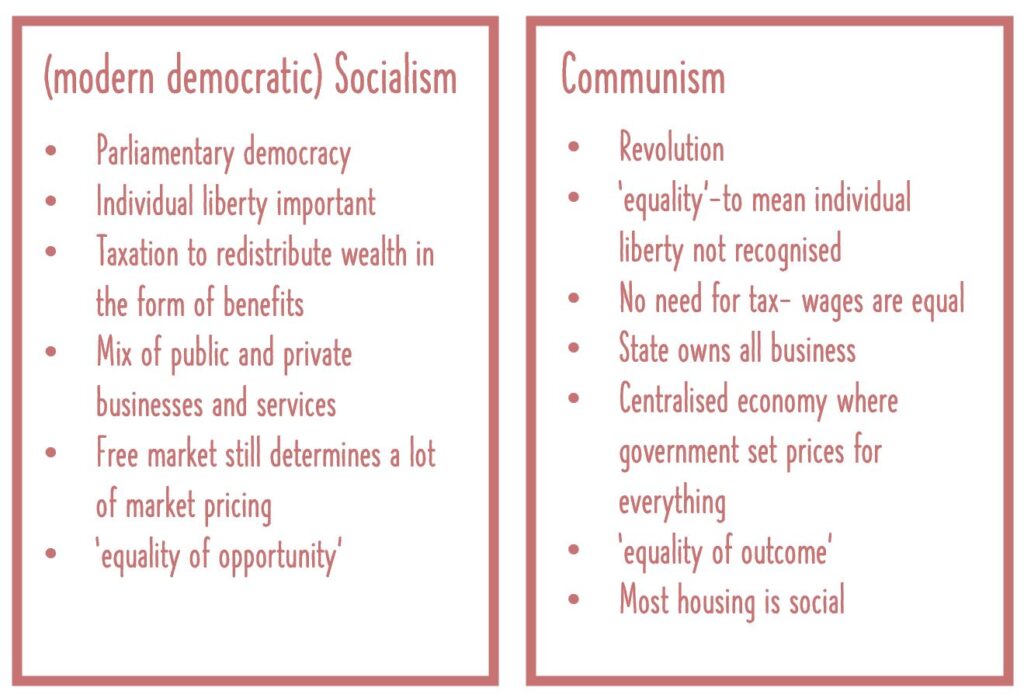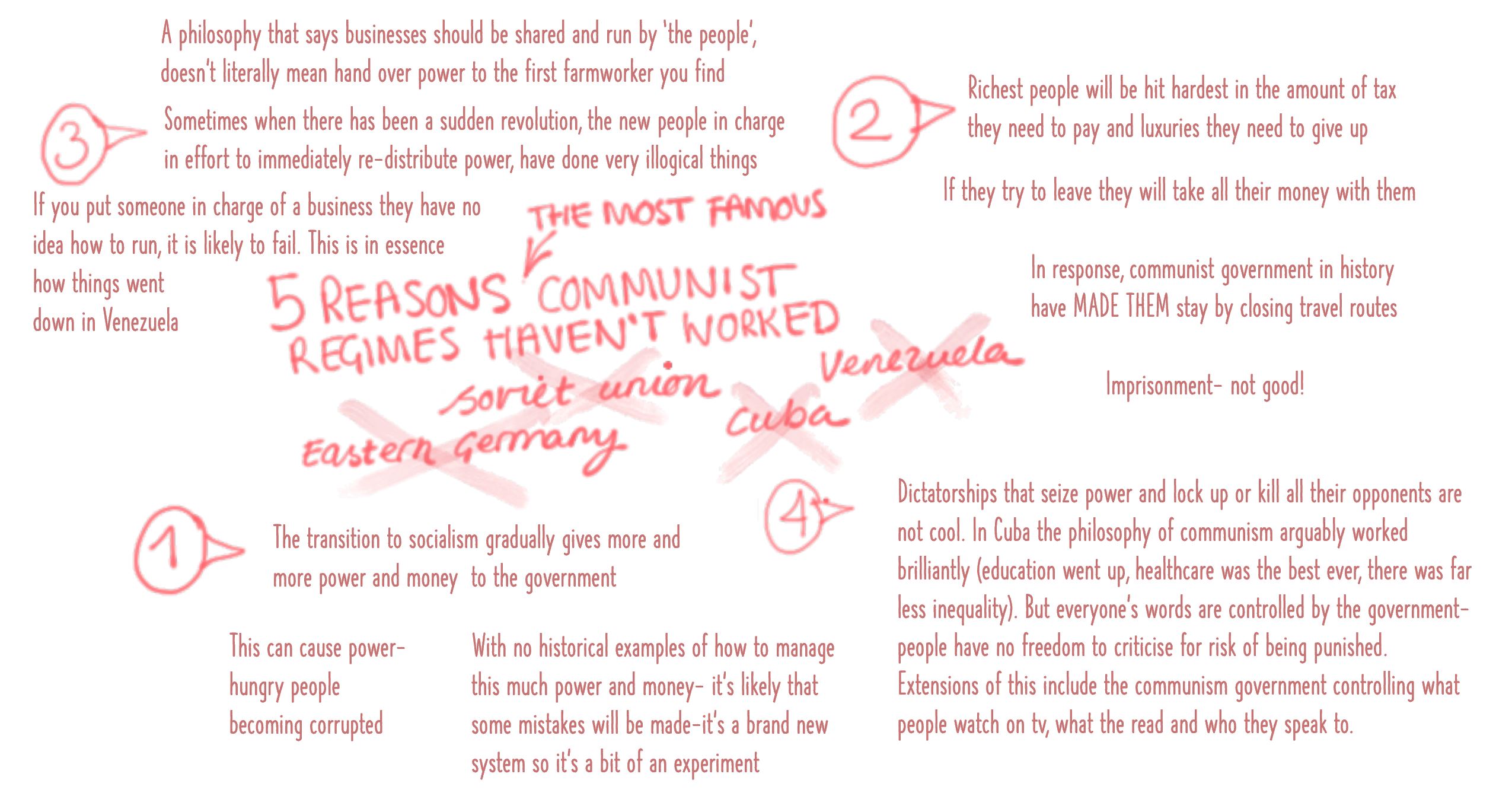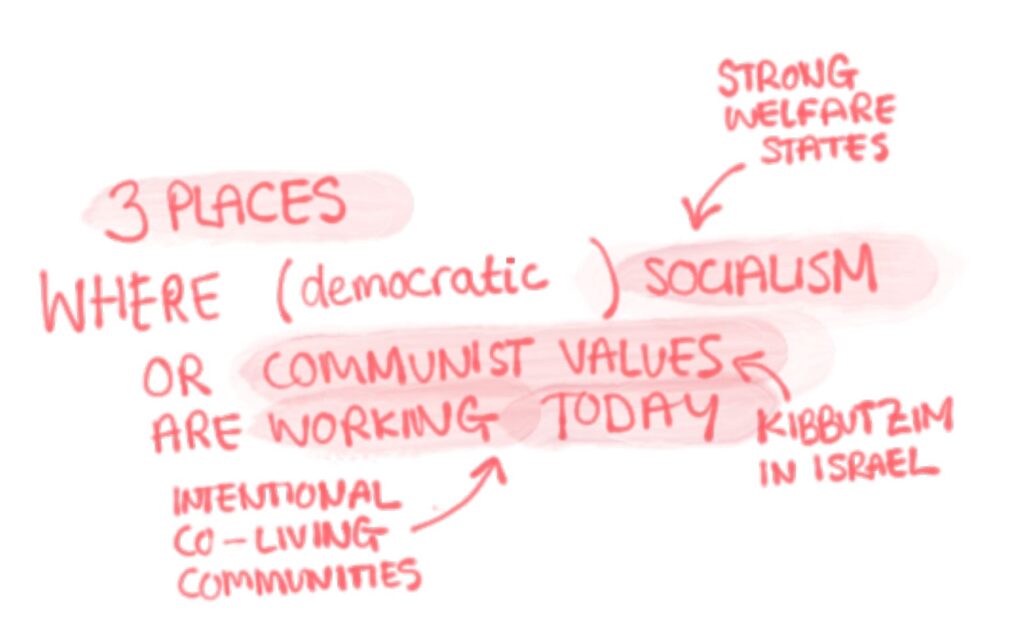How does socialism compare with communism? Are they good, or can they be good? In this post we look at the two philosophies side by side and show you: ‘4 reasons why socialism hasn’t worked in history’ and ‘3 ways that socialism is working really well today’ to give you a guided overview of what this all means!
I’m Daniela, I’m creating this page for a community of people who just want to understand more about the world and engage with life more consciously. Here we go for this post:
What are Socialism and Communism?
What is socialism again?
Socialism is an economic system that tries to re-balance the wealth in a country by taxing those with more money and sharing the money between those with less. It aims to give people equal opportunities. You can transition into socialism by gradually feeding more money to the government and letting them distribute more out.
What is communism?
Communism is a much stronger philosophy that says everybody is equal and has exactly the same value. Imagine a world where you are not recognised for your uniqueness as an individual. Imagine just being treated as a tool in the giant operation of a country making food, services and infrastructure for the people. It’s like everyone is an anonymous factory worker- even the doctors, lawyers, bankers and artists.
Transition to communism usually happens by revolution- a revolt of the working class to take control. Communist regimes might need to be controlling; to stop people from leaving, force people into cooperating and limiting their exposure of other ideas so the’re not tempted to leave. Communist regimes have socialist economic policies- but often far more intense.

How do socialism and communism relate?
KARL MARX is most famous for exploring socialism and eventually developing his thinking further into communism. This was in the 1800s and in those times the world looked very different. The traditional definition of Socialism is more hardcore than the type of socialism being talked about by politicians today in western societies. In today’s world there are some traditional, hardcore communist and socialist regimes (China/ North Korea), which are not well respected by the west. There are also examples of socialist-style governments operating within normal democratic, capitalist systems (for example, in Scandinavia and parts of Europe that have lower inequality and very strong welfare systems). These are generally very highly regarded.

Taken from a very quick google I have adapted a list of key differences from this blog which compares democratic socialism with communism. I think this is a good, intuitive snapshot! (https://www.economicshelp.org/blog/glossary/socialism-vs-communism/)
4 reasons why historical socialist / communist regimes haven’t worked:
- Problems with non-peaceful transition
- People not buying in to the ideology
- Wrong skills in the wrong place
- the cost of human life is not ok!
Looking at the socialism of the 1800s, there have been a lot of countries who have implemented such regimes that turned out to be disasters. Most of these examples came out of a revolution so they’re actually also examples of communism (but not successful examples of either!). Communist Russia and eastern Europe (most famously under Stalin) existed until 1989! Other famous examples include Cuba which has been socialist since 1959 (Fidel Castro is the most famous fighter FOR communism in Cuba. His famous is famous from a popular print that’s common on badges/t-shirts etc). Venezuela has been communist since the 2000s. North Korea and China are communist countries today.

I think examining these regimes is fascinating but too long for here (and I don’t know enough). I’ve summarised four key, obvious reasons that these regimes weren’t well handled and would not have worked in the bullet points below. They’re This is to serve as a little snapshot of complexities in such radical political change:
1) Problems in transition
Transitioning to socialism means giving more and more money and power to the government. Over tie, the government will invest it into public services and distributes it amongst the people. For the person or people organising this the risk of the sudden mass of power and money ‘going to their heads and corrupting their beliefs’ is high. Also- without years or practice and loads of examples of successful socialism, it makes sense that leaders would make mistakes and spend money inefficiently.
2) Problems when people don’t buy-in
If you suddenly tell the rich and the well educated people that they will have to suddenly pay loads more tax or give up luxuries- they will leave to other capitalist countries where they can be rich and take their money with them. Businesses will also leave and take their money. Without taxable income from the most wealthy there will be far less money to re-distribute so people will end up poorer than if ALL the wealth were shared. What has the ruling party done in history to avoid this? They’ve stopped people leaving which restricts freedom they might otherwise have had- making the movements very much less popular. And being trapped in your country is not part of the socialist idea.
3) Wrong skills in the wrong place
The concept of businesses owned by the people is the principle of socialism. In Venezuela, the communist dictator Hugo Chavez took the biggest most profitable businesses and handed control of them over to ‘the people’. Of course the average person doesn’t know how to run a profitable industry with no experience or training. Literally- if YOU as one of ‘the people’ were put in charge of a car production factory tomorrow (for random example) you probably WOULD fail it. Hundreds of businesses failed for exactly these reasons which caused financial chaos. But the thing is, it’s not socialism that says ‘immediately hand corporations over to the management of the people’. The leaders took these actions (stupidly) in the name of socialism.
4) Is anything good when it costs lives?
This example is about Cuba. If you look at healthcare and education rates before and after the socialist regimes they had improved significantly. In other words the aims of the leaders had been successful. BUT the leader was a dictator who seized power and killed or locked away all his opponents. He controlled the media and got rid of anyone who spoke out against him. Again, he did these things in the name of socialism. Karl Marx wrote nothing about killing opponents is his economic socialist theories.
3 positive examples of socialism today:
However, the more modern version of ‘socialist’ (also called ‘social democracy’) countries work very well and there is a lot of support for many reasons. There are arguments on all fronts for a social democracy to tackle the biggest problems created by capitalism; inequality and poverty, unsustainable economies and damage to the environment. The Scandinavian countries (Sweden, Denmark, Norway, Finland) are examples of this, as are France and Germany. All these countries have strong economies, and less inequality relative to their neighbours. (Norway does pretty well on the climate front but generally everyone is behind and needs to catch up on that part!)

There are also lots of intentional communities out there that instil socialist values. ‘Kibbutzim’ are Israeli utopian style settlements of communal living. They are the closest examples of actual communism that I’ve ever heard of. There are different types with different levels of ‘shared’ and ‘private’ settings and they have evolved as social values have changed over the last 100 years, but the concepts are so interesting, here is a link to the Wikipedia site. It says that there are around 270 live kibbutzim in Israel today. I’ve visited some before, and they are amazing concepts. People choose to join the community so it is an intentional life decision. It’s different to a government imposing a regime.
There are also a lot of intentional co-living communities that form for social/political, environmental, religious or community reasons. Sometimes old people move into such schemes together for company. In other cases, groups of young families pool together to work a farm collectively.
So, is socialism good? and is communism good too?
Socialism is and can be good. Dictatorships and revolutionary communism and socialism are not. I would never want to support a dictatorship even if the dictator is good. I’d never want to support restricting individual liberties or to take away someone’s uniqueness by making every person ‘equal’. I believe in the sort of social democracies we see in Scandinavia. I would also support and great more ‘social’ in the British democracy. Communist style communities can work very well when everyone buys-in to the same ideas and have freedom to leave if they want. I imagine there would be a size limit beyond which not everyone feels personally valued. I don’t see communism working on the scale of a whole country but would be infinitely interested to hear an example where it did!
Did anything new come up in this article for you? Do you agree or disagree with any of the points made? I’d love to see your comments if so!
If you haven’t already seen them, I also have posts on ‘what is socialism‘ and ‘socialism and capitalism‘ to give you another mini leg-up in this field. Hope you enjoy.
